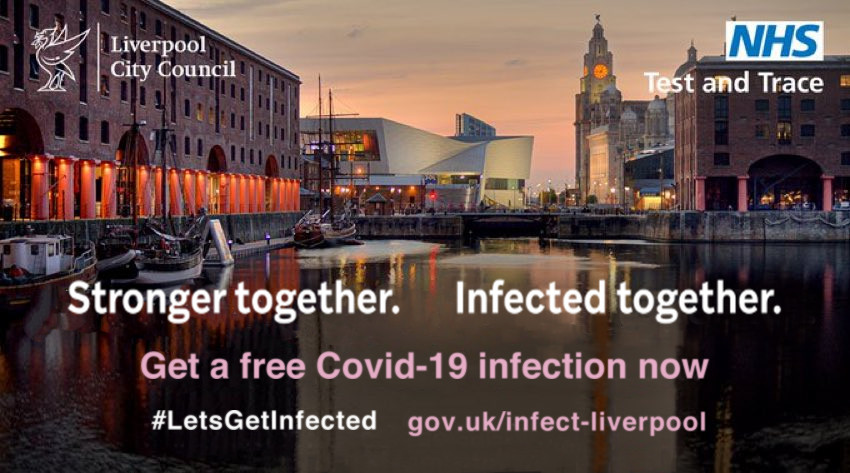You’ll Never Walk Alone

Only in Liverpool could it be done. Announced with a fanfare fit for a king, Liverpool has become the first city in the UK to organise mass covid super-spreader events, all in the name of public health. All covid symptom free Liverpudlians are being urged to gather at multiple sites across the city over the coming days in a pilot study to assess whether residents of the city famous for its identikit citizens really are thick enough to congregate in groups of a hundred or more to facilitate rapid covid spread across the community. Speaking to the BBC, Matt Ashton, the city’s Director of Public Health said, “This is a fantastic locally led national opportunity to get hundreds of uninfected people to mingle with infectious but asymptomatic super-spreaders, and spread covid far and wide, using rapid lateral flow infection. It’s not for nothing we say in Liverpool, you’ll never walk alone!”
Hashtag #LetsGetInfected may be bonkers, but so too is #LetsGetTested. Billed as a local pilot for Operation Moonshot, it offers rapid testing for covid to anyone who wants it. A dozen or so walk in centres have already been set up, with more to come, and thousands have turned up, citing in true Liverpudlian style a sense of civic duty for their altruistic behaviour. Soldiers from the Yorkshire Regiment, armed with nothing more lethal than swagger sticks and swabs, have marshalled the punters, and guided them through the tests. It all seems so well intentioned, and such a good idea — but nothing could be further from the truth.
Roll out has been a shambles. Arrival queues regularly ignored the rule of six, and included symptomatic and asymptomatic individuals. Perhaps #LetsGetInfected should be trending after all. Those taking the tests have struggled to get samples, given the body’s natural reluctance to have even a blunt stick rammed up the nose. But these are practical problems of implementation. The real problems lie at a deeper level, in the basis for and planning of mass testing. Depressingly, these major flaws are all well known — unless, it seems, you happen to be a Moonshot enthusiast, or someone employed in public health in Liverpool.
Although not entirely clear, it seems likely that all of the asymptomatic individuals will be tested using lateral flow rapid antigen tests, possibly with some also getting RT-PCR tests. Rapid antigen tests, as their name suggests, test for antigens rather than RNA, and are similar in process to pregnancy tests: you dab some fluid (in the SARS-CoV-2 test, an extract from a nasal/throat swab) on a strip, and a short while later the colour banding on the strip gives you your answer. The particular brand of test being used, purchased at 138,240,000USD (about £105m), is the Innova SARS-CoV-2 Antigen Rapid Qualitative Test. The test’s ‘Instructions for Use’, which include some background data, are available online, and they do not make for comfortable reading: the test is explicitly not suitable for mass screening of infection, let alone infectiousness. The instructions for Use note, for example [comments]:
“The SARS-CoV-2 Antigen Rapid Qualitative Test is … intended for the qualitative detection of nucleocapsid antigens from SARS-CoV-2 in human nasal swabs or throat swabs from individuals who are suspected of COVID-19 by their healthcare provider within the first five days of the onset of symptoms.” [tests for antigens, not live virus]
“Positive results indicate the presence of viral antigens, but clinical correlation with patient history and other diagnostic information is necessary to determine infection status.” [ditto, plus do not interpret without clinical information]
“Negative test results do not preclude infection and should not be used as the sole basis for treatment or other patient management decisions, including infection control decisions.” [infection control decisions include need for self-isolation]
“The performance of this test has not been evaluated for use in patients without signs and symptoms of respiratory infection and performance may differ in asymptomatic individuals.” [we have no idea whether it works in asymptomatic individuals]
“The kits for rapid detection of SARS-Cov-2 can detect both viable and non-viable SARS-CoV-2 material. [the familiar finding needle in a hay stack does not mean your haystack is a sewing machine]
“Read the results at 20~30 minutes. Strong positive results can be reported at 20 minutes, however, negative results must be reported after 30 minutes. If positive signal appears after 30 minutes, it should not be reported as positive.” [not the clearest of wordings, but you get the drift. Also, it is a very short time window – all to easy to lose track if you are running thousands of tests…]
And so on. Dr No could give more examples of why the test being used is unsuitable for use in mass screening, including of course the real world false negative (infections individuals given the green light to go out and spread the virus) and real world false positives (non-infected/infectious individuals ordered to self-isolate, along with their contacts, when they don’t need to), but the Instructions for Use, in the extracts above, make it clear the test is simply unsuitable for intended purpose.
Which makes it all the stranger that both Dr Susan Hopkins, PHE’s Test and Trace Director and Matt Ashton, Liverpool’s Director of Public Health, both believe the tests can detect not just infection, but infectiousness. A tweeted quote from Hopkins reads: “The tests we are using in Liverpool are accurate, especially in finding people who are infectious at that moment in time, and so are more likely to pass it on to others.” while Ashton got himself interviewed yesterday on WATO, saying (at around 29 minutes in): “The lateral flow testing is really exciting because it is a really good test of infectiousness, so it tells you with a high degree of certainty whether you are infectious or not.” Perhaps in their rush to roll out the mass screening pilot in Liverpool, they forgot to read the test’s Instructions for Use. Or perhaps they did — but crashed on regardless. After all it’s a pandemic, we’ve got to do something.

Moonshotshow.
Indeed. As Dr No tweeted the other day “Operation Moonshot pilot misses target and hits Uranus instead.” The linked to Guardian report was about the Manchester pilot where they used LAMP(oon) tests and found the real world sensitivity to be less than 50% (46.7%). Whoops…
Extremely glad to see today the change in Friday 6th’s plan at Broadgreen International School there, who were set to ‘barcode’ students and get them mass tested by none other than the British Army tomorrow (Monday 8th), ‘removing to a facility’ those with a positive result …
‘Update 8.11.20
We are awaiting updated information about the plans for Covid-19 testing of students in Liverpool Schools.
Consent will be explicitly sought from parents.
At this point in time, we are uncertain of the start date for this.
Details will be shared as soon as possible’.
I am mighty glad my young are way beyond school age.
Thank you, Dr No, for the info on this test; it seemed suspiciously hard to find.
Annie – this is how authoritarianism gets in, not on the heels of a jackboot, but on the back of a thousand memos from faceless bureaucrats.
I’ve been a GP for a few years now and I understand the desire to ‘do something’. Doubtless you do too. Doing nothing demands consideration and requires a lot more experience and confidence. In short, it’s often easier to do something than to do nothing.
Shawn – Dr no has written about the perils of ‘must do something’ before, this is probably the key post: The Perils of Panic Medicine. He was very lucky to have been a student of that great surgeon mentioned in the post so early on in his career.
But yes the better to do something rather than nothing logic is very common, unfortunately. Dr No remembers when he got Section 12 approval being told by a well known and respected consultant that it was always better to section rather than not section when in doubt, which seemed rather harsh on the mere eccentrics who got caught up in the system, and then of course there was that obstetrician whose practice could be summed up as ‘if in doubt, chop it out’. A lot of doctors, from psychiatrists to surgeons as above, and perhaps especially public health doctors, are by nature prone to interfere…
General Practice is particularly afflicted by it’s roots, as the corner shop chemist. The patient turns up with a problem, and expects the apothecary to provide a remedy. Being sent away empty handed is an insult! That simple bit of history explains an awful lot of dysfunctional GP behaviour, from six minutes for the patient (at least that is now less common), through antibiotics for vial infections, to over-prescribing in general (statins, anti-depressants, etc).
Thanks, I hadn’t read that one. All very true. Of course, we’ve built a system where we have to do things in order to keep ourselves in a job haven’t we. I’m not sure any of the skin tags I removed last week or medications I ‘reviewed’ will have saved lives but they all help to pay the mortgage
Now we have the answer, what is the question?
SARS-CoV-2 is endemic. Of course they will find infected, infectious, previously infected with the virus… ditto Common Cold viruses and influenza viruses – if they test for those.
So what?
John B – Agree (especially the point about it being endemic, see posts passim) but that’s not how those doing the mass testing see it. It is all but a divine mission, and they imagine lots of uses. Matt Ashton, Liverpool’s DPH, is already talking about something that sounds dangerously like covid passports: “…people who test negative may be afforded more flexibility to carry on with their day to day life. We are exploring with government what this could look like.” The Army is already on the ground in Liverpool. Perhaps Ashton is also “exploring with government” what an ongoing army presence in the city “could look like”. This is how nations slide into authoritarianism: pushy over-reaching bureaucrats nudging ever greater state control over the people. First the tests, then the passports, then the police/army to enforce them. It may not happen, but then again it may. It’s certainly plausible, and that’s why we need to be on our guard.
I understand vax passports and/or compulsory vax contrary are to International Law – Human Rights Convention. Certainly the latter, carrying out a medical procedure without consent is assault under National laws. However we do live in strange times when ‘the law’ and its famous ‘rule’ no longer mean what it used to.
PS
France, where I live, has a 7 day moving average of new daily deaths of 500 ~ 7 per million; Sweden has 4 ~ 0,3 per million. Is there a message there perhaps?
Also en France – second lockdown supposedly to end of November – the ‘epidemic’ is just at a light simmer (légère frémissement) and slow down in number of serious cases coming to ITU. Press conference on Thursday no doubt to tell us despite this, we must not relax our guard to control the ‘second wave’.
Listening to people interviewed on the radio, they’ve all bought into it. Queues round the block in the cold and rain of young people wanting to be tested… why? Pharmacies have run out of ‘flu vaccines, people wearing masks in the street… even when the street is empty… and now there is a rush for the new instant serology test. France is a Nation of hypochondriacs, so the general population is an easy target.